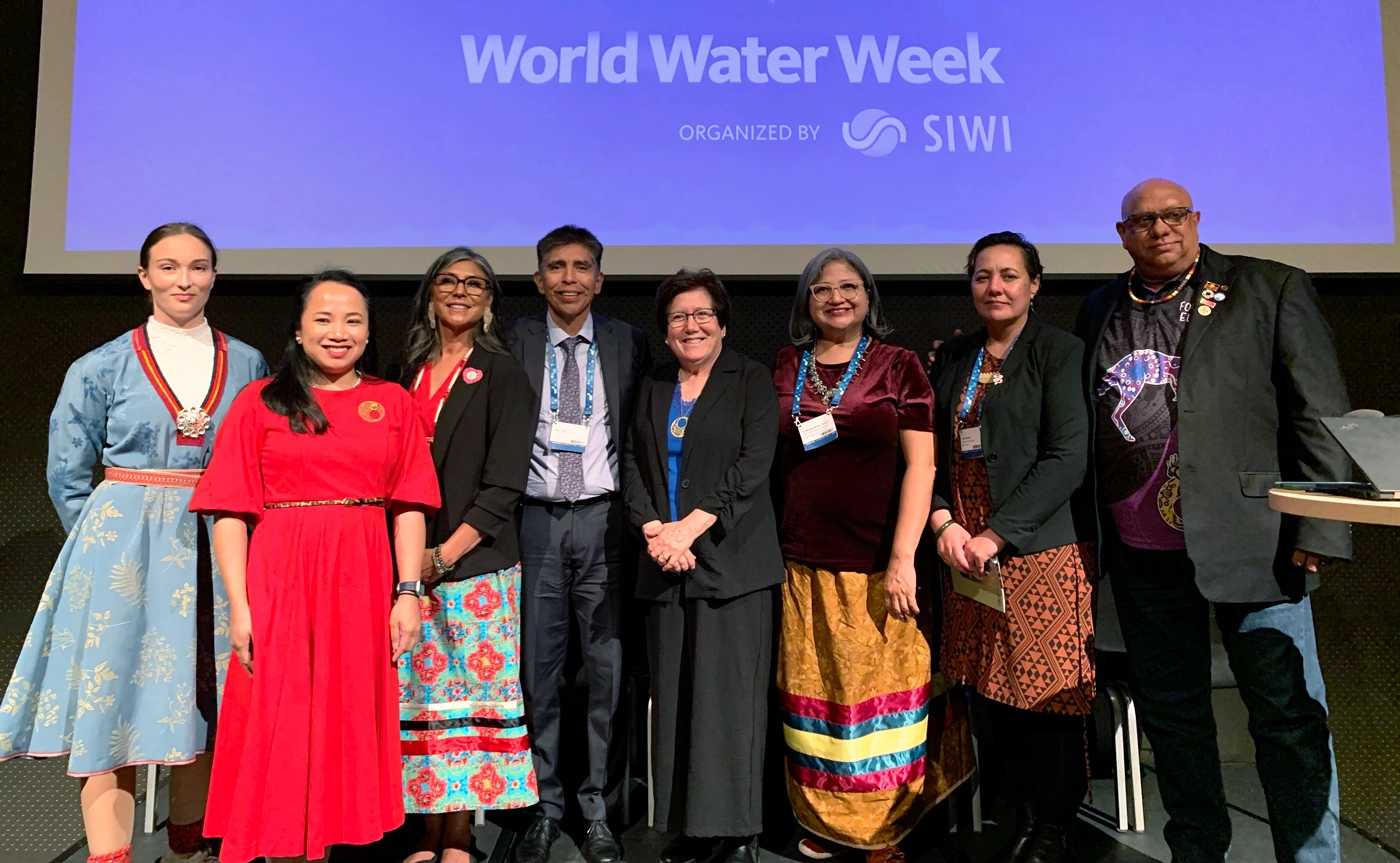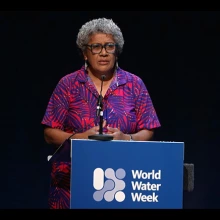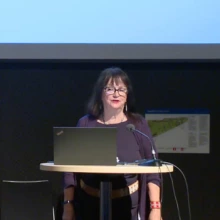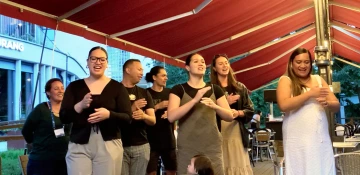
(L to R) Aana Edmondson, Camille Calimlim Touton, Lorelei Cloud, Daryl Vigil, Sharon Megdal, Michelle Brown-Yazzie, Erina Watene, Leslie ”Phil” Duncan
I recently returned from attending Stockholm World Water Week (WWW), the annual international water conference organized by the Stockholm International Water Institute (SIWI). Always an excellent conference, this one stood out for its heightened focus on Indigenous water knowledge, experiences, and communities. There had been some inclusion of Indigenous voices in last year’s WWW. In fact, it was there that I met Australian hydrologist Brad Moggridge, who gave a WRRC webinar in early 2023. However, noting the limited Indigenous presence in 2022, some colleagues engaged in some cross-continental brainstorming on session ideas, resulting in multiple Indigenous-focused session proposals that were accepted for the 2023 program. The Colorado River Basin was featured in the session “Indigenous Voices in Water Governance,” which was co-convened by the Water & Tribes Initiative | Colorado River Basin, the Lincoln Institute of Land Policy, and the WRRC. More about our session in a moment.
The conference’s Monday opening session keynote by Dr. Milika Sobey, an Indigenous Fijian marine scientist, set the stage. In her eloquent remarks, Dr. Sobey spoke about the connectivity between people and nature and the need to look at the marine system holistically. She pointed to the benefit of combining scientific rigor with traditional

Milika Sobey
practices, a concept similar to two-eyed seeing. The Vanua core values she articulated – respect, responsibility, reciprocity, and relationship – were foundational to later discussions. Connecting the need for innovation to this year’s WWW theme, “Seeds of Change: Innovative Solutions for a Water-Wise World,” Dr. Sobey reminded the audience that management is of people and their actions, rather than of the water. We can attest to that in the Colorado River Basin!
Our Tuesday afternoon session fit in well with Dr. Sobey’s four Rs, respect, responsibility, reciprocity, and relationship. Our session lived up to its description: This session will bring to the WWW stage tribal leaders in the hydrologically stressed Colorado River Basin, Australia, and New Zealand, along with a key federal official from the United States. Collectively, Native Nations in the United States hold rights to a substantial portion of Colorado River water, but some await quantification of water rights and/or construction of infrastructure to deliver water. With an estimated 40 million people relying on Colorado River water, the challenges are significant. This session on Indigenous water governance will focus on the local and larger scale issues associated with climate change and demand-supply imbalance. Elevating indigenous voices will forge new ways of thinking and acting together as a community. This session will highlight innovations in water governance and management, along with new approaches to consultation and inclusion. It will create opportunities for exchange with other Indigenous peoples at the session and throughout World Water Week.

Inger Axiö Albinsson
We started the session with an acknowledgement to the Sami people and the Sami lands of Stockholm by Inger Axiö Albinsson of the Stockholm Sami Association. Although many are now accustomed to land acknowledgements that express respect and recognition of the Tribal lands on which we live and work, this was a new experience for Ms. Albinsson, who spoke from the heart. From the Colorado River Basin, Daryl Vigil (Co-Director, Water & Tribes Initiative), Camille Calimlim Touton (Commissioner, U.S. Bureau of Reclamation), Michelle Brown-Yazzie (Assistant Attorney General, Navajo Nation Department of Justice), and Lorelei Cloud (Vice Chairman, Southern Ute Tribe) shared their experiences and knowledge, along with their water challenges. Leslie “Phil” Duncan (University of Canberra), Erina Watane (Waikato River Authority), and Aana Edmondson (Sami Youth Organization) added their insights. There was time for audience questions and closing comments. The feedback about the session was positive; there was enthusiastic response to the sharing by and learning from the speakers.
The enthusiasm for sharing and the richness of interactions were nothing short of amazing. Unfortunately, because I arrived a day late due to a cancelled flight, I had to miss a special day organized by the Sami Association of Stockholm for Sunday, August 20. It was clear that strong bonds were established during this day of learning about the history and current issues of the Sami. Friendships and warm collegiality strengthened across the days. There was crossover of speakers in the sessions. There was eagerness to continue the dialogues. There was breaking of bread. There was constant welcomeness. On Tuesday, the Australian Embassy and the Australian Water Partnership hosted a reception

Maori Waiata (singing)
for First Nations and Indigenous delegates and friends of Australian Water Partners for Development. There, the Māori delegation completed the evening program with their speech and Waiata (singing) which is their traditional practice, something that they were kind enough to do again the following evening at the casual dinner many of us attended. That beautiful evening marked the end of my visit due to another flight cancellation. I left Stockholm early so as not to be stranded in Europe at a time when much awaited my attention back in Tucson.
A key take-away for me is a reminder on the importance of respect and listening to learn, along with the importance of building relationships. That way we can benefit from reciprocity, that is, exchange for mutual benefit. Whether in times of water crisis or not, this is our responsibility.

